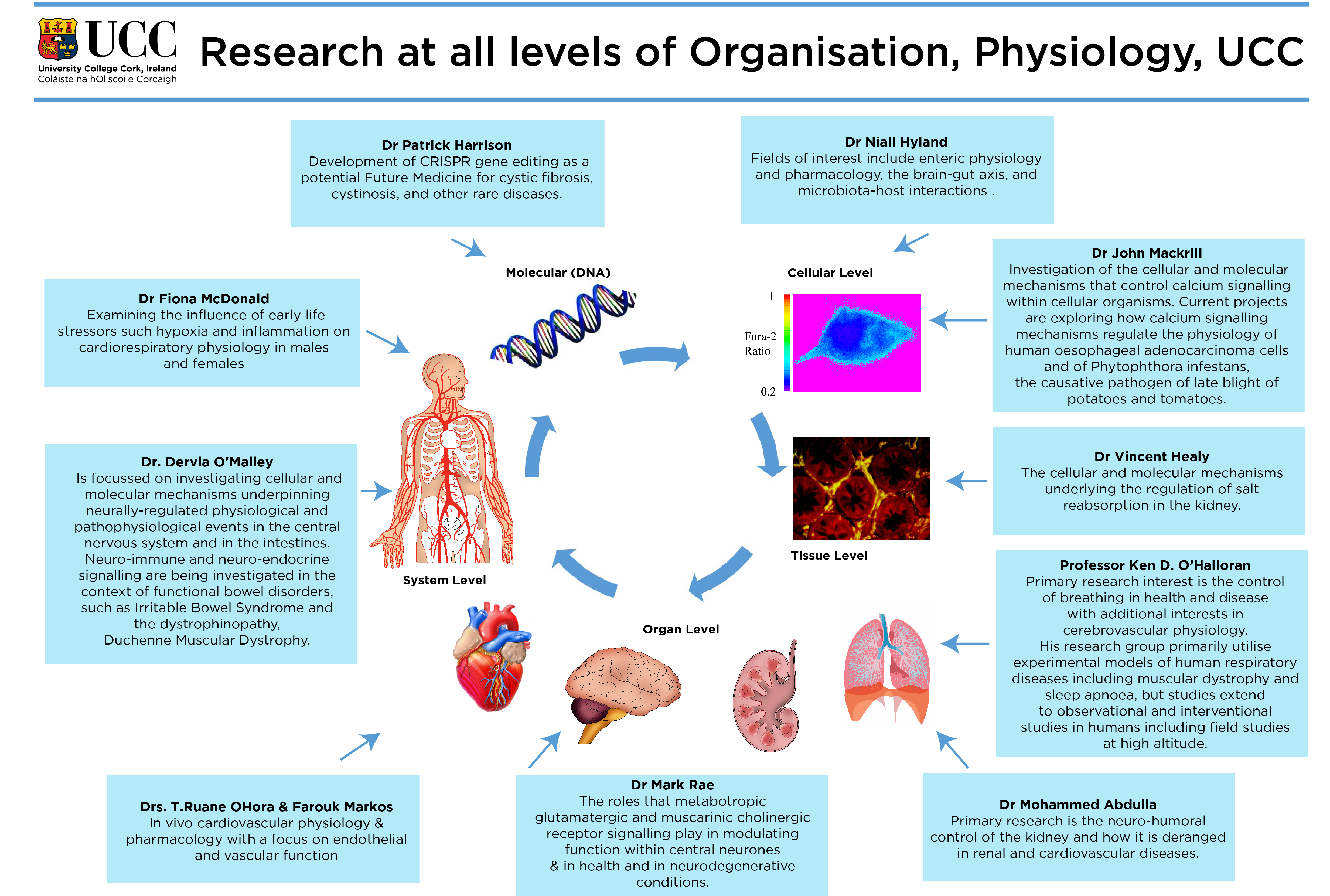
Cardiovascular Physiology
Dr T. Ruane O' Hora and Dr Farouk Markos
Invivo cadiovascular physiology & pharmacology with a focus on endothelium and vascular function.
These areas of studies are undertaken at a basic scientific level but all impact, to a greater or lesser degree, on the cardiovascular system and its regulation and may contribute to understanding the progression of a range of cardiac and vascular diseases. Thus, these areas of research are poised to take advantage of post-genomic era and to open up investigations in translational research.
Respiratory Physiology
Professor O’Halloran's primary research interest is the control of breathing in health and disease with additional interests in cerebrovascular physiology. His research group primarily utilise experimental models of human respiratory diseases including muscular dystrophy and sleep apnoea, but studies extend to observational and interventional studies in humans including field studies at high altitude.
Gastrointestinal Physiology
Irritable Bowel Syndrome (IBS) is characterised by debilitating symptoms such as abdominal pain bloating and altered bowel habit and affects 10-20% of the world’s population. As current therapeutic strategies are limited by side effects and safety issues, new avenues of research in this field are highly desirable.
Dr Hyland has over 20 years’ experience in gastrointestinal physiology and enteric neuroscience and his fields of interest include enteric physiology and pharmacology, the brain-gut axis, and microbiota-host interactions. His laboratory has developed expertise in assessing gastrointestinal physiology using the Ussing chamber technique. Niall is also a Funded Investigator in the ‘Gut Brain Microbe Axis’ theme at APC Microbiome Ireland and has long-established collaborations with global leaders in the microbiome-gut-brain axis field.
Genome manipulation technologies
Development of CRISPR gene editing as a potential Future Medicine for cystic fibrosis, cystinosis, and other rare diseases.
Cell & Molecular Physiology
“Investigation of the cellular and molecular mechanisms that control calcium signalling within cellular organisms. Current projects are exploring how calcium signalling mechanisms regulate the physiology of human oesophageal adenocarcinoma cells and of Phytophthora infestans, the causative pathogen of late blight of potatoes and tomatoes.”
The roles that metabotropic glutamatergic and muscarinic cholinergic receptor signalling play in modulating function within central neurones and in neurodegenerative conditions such as Alzheimer's disease and Down Syndrome primarily using electrophysiological and calcium imaging techniques
The cellular and molecular mechanisms underlying the regulation of salt reabsorption in the kidney.
Neurophysiology
The roles that metabotropic glutamatergic and muscarinic cholinergic receptor signalling play in modulating function within central neurones and in neurodegenerative conditions such as Alzheimer's disease and Down Syndrome primarily using electrophysiological and calcium imaging techniques.
Colin’s research interests are multidisciplinary spanning Neurophysiology and Engineering. His group focuses on understanding high-level brain physiology underpinning movement, cognition, learning and memory. To understand fundamental brain function, they develop closed-loop brain machine interfaces to interact with ongoing brain activity in real-time while simultaneously recording the activity of hundreds of neurons. By exploiting the fundamental understanding gained using these methods and electronic systems, they seek to develop treatment approaches to correct pathophysiological activity associated with specific brain disorders. Colin and his team additionally investigate the role of brain body interactions including the gut microbiome in influencing activity in these brain networks via the vagus nerve. This includes understanding effects on learning and memory and the potential to drive neurodegeneration in Parkinson’s disease.
Human & Exercise Physiology
Professor O’Halloran's primary research interest is the control of breathing in health and disease with additional interests in cerebrovascular physiology. His research group primarily utilise experimental models of human respiratory diseases including muscular dystrophy and sleep apnoea, but studies extend to observational and interventional studies in humans including field studies at high altitude
Renal Physiology
Primary research is the neuro-humoral control of the kidney and how it is deranged in renal and cardiovascular diseases.
Integrated Physiology
Dr. McDonald’s primary research interest is in understanding how the neonatal mammal responds to perinatal stressors such as hypoxia and inflammation using animal models. Our lab is also collaborating with INFANT to analyse clinical near infrared spectroscopy data, that provides information on the cerebral oxygenation of neonatal infants, to examine if there are correlations between the signal features and poor clinical outcomes of the infants.
Physiology Department
Fiseolaíocht
Contact us
Western Gateway Building Western Road University College Cork
